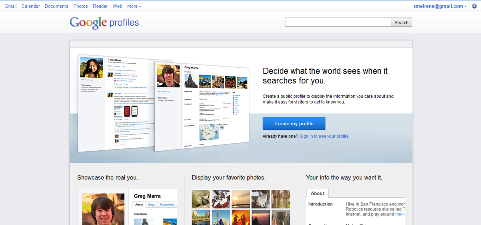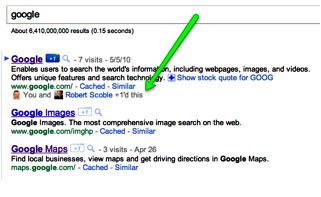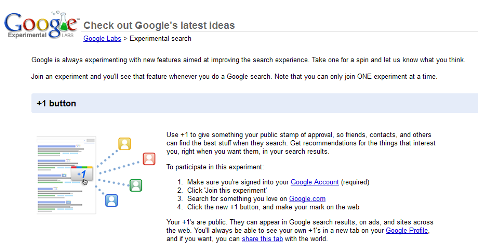 Is your business ready for social search? In this article I'll reveal what you need to know and what you need to do to prepare for social search.
Is your business ready for social search? In this article I'll reveal what you need to know and what you need to do to prepare for social search.
The Emergence of Social Search
Earlier this year I predicted that this would be a breakout year for social search. It seems I was right—however, it's unfolding differently than I expected, with Google leading the charge.
It turns out that Google is not going to sit back and allow Facebook to eat away at their search advertising revenue. Instead, Google has recently made some bold moves that all online marketers should be responding to.
What's happened is Google recently changed its search algorithm that determines what type of online content is the most relevant—specifically placing greater emphasis on original social content.
While Google didn't specifically announce a focus on social content, the handwriting was already on the wall. Prior to the recent changes, Google co-founder Sergey Brin commented that Google has only touched 1% of what they're capable of with social search.
Indeed, you may have already noticed that socially shared content is rising to the top of your Google search results. So, if you want to earn higher rankings with Google, you not only need to be creating high-quality content, but also actively encouraging its sharing on the social networks.
Social Content Matters for Search
Why so much emphasis on social content? For one, there's so much of it. Google can't ignore the fact that social content is being created at a breathtaking pace. And because search is all about content, they have to go where the action is.
The second reason is that social content is contextual—rich with original perspectives that result from sharing on the social networks.
Unfortunately for Google, one of the largest sources of social content is within Facebook—a place that Google can't access. To acknowledge that would be tipping their hat to archrival Facebook. Instead, they're just quietly going about the business of aggressively indexing what's available—with blogs, Twitter, YouTube and Quora as leading sources.
Social Search
Search is what drives the web, and Google is still the leader with nearly 65% of the market. However, Google recognizes that Bing is a viable competitor that happens to have a partnership with Facebook, as well as with Yahoo. To maintain their dominance, they're making adjustments. You'll have to do the same to keep your business relevant online.
The following three practices will help you focus your online marketing efforts to maximize your relevance for social search.
#1: Create fresh and original content
Google's internal name for the recent changes to their search parameters is the Panda Update. If you Google that phrase, you'll find numerous rants regarding how particular sites lost up to 90% of their traffic following these recent changes. The reason for this is Google downgraded not only specific content, but also domains where there was an abundance of it.
So, if you happen to be a blogger who has been creating high-quality, original content for your community, Google just gave you a big thumbs-up. While there are a number of places to create your online content, a blog that you control is arguably the best place.
Thus, your primary objective is to strive for originality. If you're going to republish the words of others, do so only to the extent required for supporting your original perspective. And of course, always ask for permission and provide attribution.
Get World-Class Marketing Training — All Year Long!
Are you facing doubt, uncertainty, or overwhelm? The Social Media Marketing Society can help.
Each month, you’ll receive training from trusted marketing experts, covering everything from AI to organic social marketing. When you join, you’ll also get immediate access to:
- A library of 100+ marketing trainings
- A community of like-minded marketers
- Monthly online community meetups
- Relevant news and trends updates
Here are some guidelines for creating original content.
- Provide your unique perspective—If your perspective is truly unique, it adds something original to news that's available elsewhere. This is why fans tune in to Howard Stern or David Letterman, and why your community will do the same for you.
- Curate only the best content—Do your research and learn from other experts first, then personalize only that content that's highly relevant to your community.
- Learn from your community—Regularly engage with your community to learn and discover the unsolved problems. The solutions to unresolved problems by definition have to be original.
#2: Share to build social context
To better understand how sharing builds context that enhances your online presence for social search, it's helpful to understand social graphs. This earlier article gives you a full description, but for now it's enough to know your social graph is a digital map that describes you from the context of your relationships with your connections or friends—and from the content that you all share, which includes links to articles, photos, videos and more.
A powerful step you can take to help Google find all of your social content is to establish or update your Google Profile. The recently updated Google Profile interface has been simplified, making it easy to aggregate all of your social networks, as well as other online news sources relevant to you or your social network.

Discover Proven Marketing Strategies and Tips
Want to go even deeper with your marketing? Check out the Social Media Marketing Podcast! Publishing weekly since 2012, the Social Media Marketing Podcast helps you navigate the constantly changing marketing jungle, with expert interviews from marketing pros.
But don’t let the name fool you. This show is about a lot more than just social media marketing. With over 600 episodes and millions of downloads each year, this show has been a trusted source for marketers for well over a decade.

For example, in addition to the major social networks, I'm also able to link to all of my articles here on Social Media Examiner by simply plugging in the RSS feed. Because your Google Profile is personal to you, bringing in feeds from your business blog or other news sources elevates your social influence in your business communities.
Another important reason for maintaining a Google Profile is that it's required to use the new Google +1 button. The Google +1 button is Google's answer to the Facebook Like button. It's a vote of confidence that adds more social context to your original content.
You may have noticed how Bing is more frequently showing pages in their search results that are Liked by your Facebook friends. Google +1 will do the same on Google search results for your friends across multiple social networks.

How does Google know who your friends are? From all of those feeds passing through your Google Profile. Google +1 is still experimental, but you can start using it now by going here.

Here's a list of actions you can take to encourage sharing that builds your social graph and the relevance of your business for social search:
- Update your Google Profile—Update your bio and verify the accuracy, relevance and completeness of your social and news feeds.
- Include social sharing in your newsletter—Most email services now allow for social sharing. Whatever is digital can be readily shared.
- Start using QR codes—QR and other 2D codes make real-time sharing with mobile devices easy.
- Create social objects—Social objects such as photos and videos have a tendency to be shared more often than printed news because they're instantly engaging.
- Share and share alike—The more you share, the more others will share your content.
- Make a call to action—Your community may not understand the importance of sharing, so don't hesitate to ask them.
#3: Use location and time to enhance relevance
In response to the many comments regarding the changes to their search formula, Google simply affirmed that their objective with search is the same as it has always been: to return the most relevant information as quickly as possible.
While we live in an increasingly global business environment, what's most relevant is what's happening in our own environment—or the one we happen to be visiting. Fortunately, optimizing your location is now practically unavoidable thanks to the prevalence of geotagging.
You may think that location isn't relevant for your business if you don't have a location that your customers regularly visit. However, consider that if you're a technology expert who has any kind of association with Palo Alto, your influence is instantly enhanced.
Thus, there's more to location than just proximity. Location is just one example of context. Another is time. In their effort to provide relevant content for search terms, Google and other search engines make an assumption—right or wrong—that real-time news is more relevant than what happened yesterday.
This means you have to make an effort to use real-time networks such as Twitter to keep your content fresh for Google and your community.
Here are some best practices for making the most of location and time for social search:
- Claim your business on Google and Facebook Places—If you're a local business, claim your location on Google, Facebook, Foursquare and anywhere else where your prospects and customers may be active.
- Turn on Twitter Location—Location adds context to your Tweets, and it pinpoints your business for those using Advanced Twitter Search.
- Check in with Facebook, Foursquare and Picplz—Use social check-ins to communicate that you're actively engaging with prospects and customers.
- Monitor your brand with real-time search—In addition to Google, SocialMention is one of my favorite real-time search tools because it also tags influentials. When you see a spike in your traffic, use SocialMention to learn more. (Editor's Note: SocialMention is no longer an active online tool.)
The most important thing to keep in mind regarding search is that Google has been and will continue to strive to emulate human tendencies. Social networking logically makes that objective much easier, and to a great extent, explains why search is trending in that direction.
If you search for identical terms on both Google and Bing, you'll notice dramatically different results, although both are now increasingly favoring social content with contextual recommendations. At the very least, you may want to give strong consideration to developing a two-pronged marketing strategy to be relevant for both search engines.
What are your thoughts on social search? Are you ready? Leave your comments in the box below.
Attention Agency Owners, Brand Marketers, and Consultants

Introducing the Marketing Agency Show–our newest podcast designed to explore the struggles of agency marketers.
Join show host and agency owner, Brooke Sellas, as she interviews agency marketers and digs deep into their biggest challenges. Explore topics like navigating rough economic times, leveraging AI, service diversification, client acquisition, and much more.
Just pull up your favorite podcast app, search for Marketing Agency Show and start listening. Or click the button below for more information.

